外研版七年级上七年级英语一般现在时的用法
【外研版】七年级英语上册Module5Myschoolday语法篇试题含答案
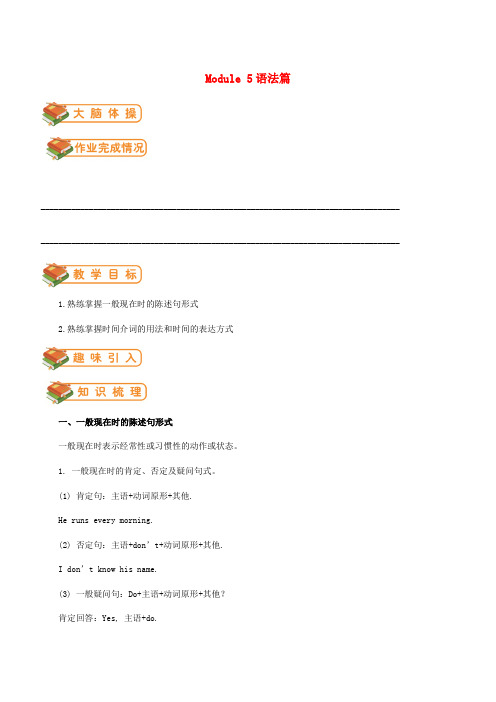
Module 5语法篇__________________________________________________________________________________ __________________________________________________________________________________1.熟练掌握一般现在时的陈述句形式2.熟练掌握时间介词的用法和时间的表达方式一、一般现在时的陈述句形式一般现在时表示经常性或习惯性的动作或状态。
1. 一般现在时的肯定、否定及疑问句式。
(1) 肯定句:主语+动词原形+其他.He runs every morning.(2) 否定句:主语+don’t+动词原形+其他.I don’t know his name.(3) 一般疑问句:Do+主语+动词原形+其他?肯定回答:Yes, 主语+do.否定回答:No, 主语+don’t.—Do you like maths?—Yes, I do./No, I don’t.(4) 特殊疑问句:疑问词+do+主语+动词原形+其他?When do you have Chinese?2. 在一般现在时中,行为动词前不能有连系动词be。
We don’t go to school on Saturday.3. do除用作助动词之外,还可用作行为动词,意为“做”。
将含有do one’s homework, do housework 等短语的肯定句变为否定句时,不能在原句谓语动词do后只接加not,而是应在do前加don’t或doesn't。
They don’t do their homework in the mornin g.二、时间介词in, on, at用法1. at常用来表示在某点时间,即“在几点几分;在某一时刻”。
如:She usually gets up at 6:00 in the morning. 她通常早上6点起床。
初中英语新外研版七年级上册Unit 3重点单词用法讲解(2024秋)

七年级英语上册Unit 3重点单词用法讲解1.silent不作声的,形容词。
silence寂静,名词。
in silence寂静地,无声地。
[例]He sat there in silence. Silently沉默地,寂静地,无声地,副词。
[例]They all stand silently for a moment.2.strict严格的,严厉的,形容词。
[用法](1)be strict with sb. 对某人很严厉。
[例]Miss Wang is strict with us.(2)be strict in sth. 对做的某事很严格。
[例]Mr Gao is strict with our homework.3.follow跟着,跟随,动词。
[用法]follow sb.跟随某人。
[例]An older man with a strict face follows him. Following接着的,下列的,形容词。
[例]You can choose one from the following three books.4.postman邮递员;邮差,名词。
复数形式是postmen。
[例]This is my favourite film, Postmen in the Mountains.5.touching感人的;动人的,形容词。
[例]It’s a touching story about the love between father ans son. Touch触摸;触碰,动词。
[例]I liked the cat when I touched it at the first time.6.serve为......工作;供职,动词。
[用法]serve as...充当/担任......。
[例]For years, my father served as the postman for this town. Service服务,名词。
七上英语书外研版第四单元知识点
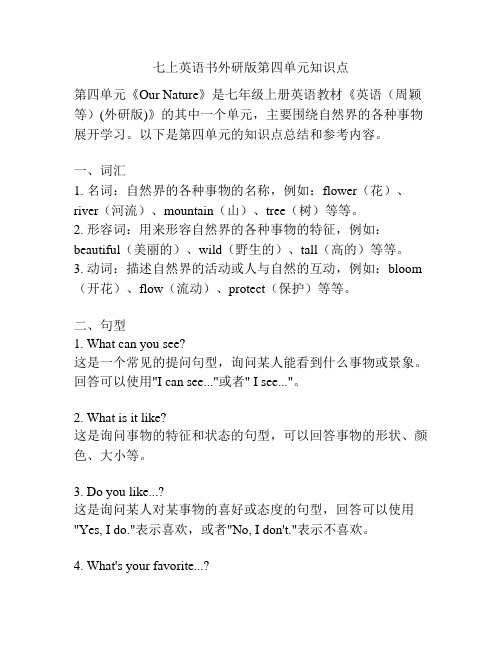
七上英语书外研版第四单元知识点第四单元《Our Nature》是七年级上册英语教材《英语(周颖等)(外研版)》的其中一个单元,主要围绕自然界的各种事物展开学习。
以下是第四单元的知识点总结和参考内容。
一、词汇1. 名词:自然界的各种事物的名称,例如:flower(花)、river(河流)、mountain(山)、tree(树)等等。
2. 形容词:用来形容自然界的各种事物的特征,例如:beautiful(美丽的)、wild(野生的)、tall(高的)等等。
3. 动词:描述自然界的活动或人与自然的互动,例如:bloom (开花)、flow(流动)、protect(保护)等等。
二、句型1. What can you see?这是一个常见的提问句型,询问某人能看到什么事物或景象。
回答可以使用"I can see..."或者" I see..."。
2. What is it like?这是询问事物的特征和状态的句型,可以回答事物的形状、颜色、大小等。
3. Do you like...?这是询问某人对某事物的喜好或态度的句型,回答可以使用"Yes, I do."表示喜欢,或者"No, I don't."表示不喜欢。
4. What's your favorite...?这是询问某人最喜欢的事物的句型,可以回答某个特定事物或特定类别的事物。
三、语法1. 一般现在时一般现在时表示经常发生的动作、事实、习惯、存在的状态等。
句子的基本结构是主语 + 动词原形 + 其他成分。
例如:I like flowers.(我喜欢花。
)2. 物主代词(形容词性物主代词和名词性物主代词)形容词性物主代词在句子中作定语,修饰名词,表明所属关系。
名词性物主代词在句子中作主语或宾语,替代名词。
例如:This is my book.(这是我的书。
)The book is mine.(这本书是我的。
外研版英语七年级上册语法总结
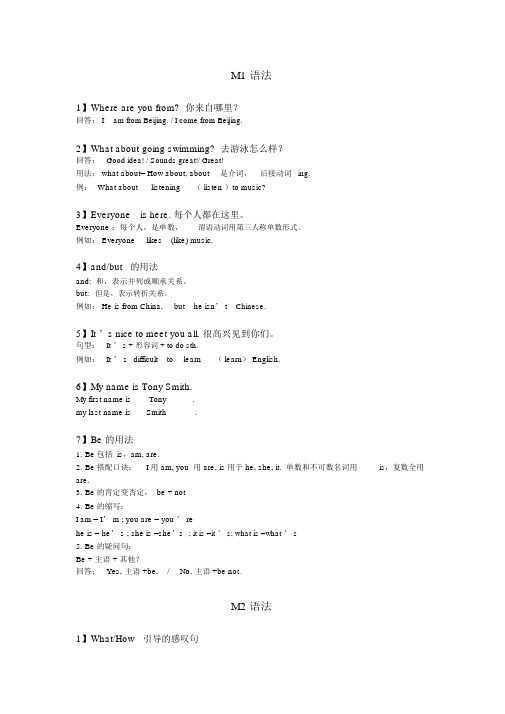
M1 语法1】Where are you from? 你来自哪里?回答: I am from Beijing. / I come from Beijing.2】What about going swimming? 去游泳怎么样?回答:Good idea! / Sounds great!/ Great!用法: what about= How about, about是介词,后接动词ing.例:What about _ _listening __ ( listen )to music?3】Everyone is here. 每个人都在这里。
Everyone :每个人,是单数,谓语动词用第三人称单数形式。
例如: Everyone __likes__(like) music.4】and/but的用法and: 和,表示并列或顺承关系。
but:但是,表示转折关系。
例如: He is from China, __but _ he isn’ t Chinese.5】It ’s nice to meet you all. 很高兴见到你们。
句型:It ’ s + 形容词 + to do sth.例如:It ’ s difficult _ to learn_ _ ( learn) English.6】My name is Tony Smith.My first name is ___ Tony______.my last name is___ Smith ______.7】Be 的用法1.Be 包括 is,am, are.2.Be 搭配口诀:I 用 am, you 用 are, is 用于 he, she, it. 单数和不可数名词用is,复数全用are.3.Be 的肯定变否定, be + not4.Be 的缩写:I am = I’ m ; you are = you ’ rehe is = he’ s ; she is =she’s; it is =it ’ s; what is =what ’ s5. Be 的疑问句:Be + 主语 + 其他?回答:Yes, 主语 +be. / No, 主语 +be not.M2 语法1】What/How引导的感叹句What + a/an + 形容 + 名+ (主 +)!=How + 形容 / 副 + 主 +!What a big family ( it is ) ! =How big the family is!What fine weather ( it is )! = How fine the weather is!2】in front of在前面/ in the front of在前部3】名词所有格两人共有: A and B’ s + is两人分有:A’ s and B’ s +are例如:Mrs Green is __A__ mother.A. Lingling and Lucy’ sB. Lingling’ s and Lucy’ sC. Lingling’ s and Lucy4】合成词合成复数,一般情况,后面的复数。
2013外研版七年级上册一般现在时复习用课件
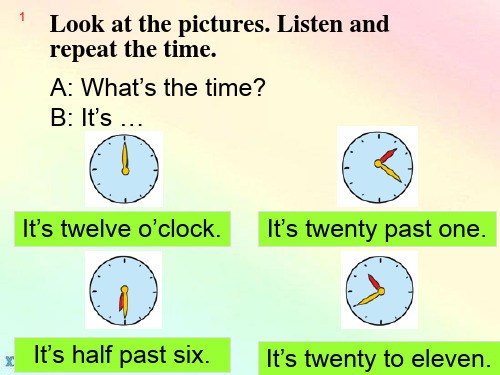
6. 3:45 _____________________________ three forty-five/a quarter to four
二、用相应的介词填空。
1. I have dinner __ seven at home. at
2. Lucy can go to the factory ____ her with
二、用所给的单词的适当形式填空。 1. She ____ (go) to bed at nine o’clock. goes 2. You don’t go (not go) home. ________ 3. She _______ (watch) TV in the evening. watches 4. He gets up and ___ (have) breakfast. has 5. _______ (lesson) start at half past one in Lessons the afternoon. 6. We do our __________ (homework) in homework the evening.
在表述日常行为时会用到时间,要注 意英汉不同的时间表达方式, 试比较: at half past six (6:30) 在6点半
at five past six (6:05) 在6点5分
at twenty to seven 6:40) 在6点40分
注意:如果是半小时以内的时间,一般 用几点过几分的表达方式,即 “…past…”, 如: 5:25可以表达为twenty-five past five; 如果超过了半小时,则用还差几分不到几 点的表达方式,即 “…to…”, 如: 5:45 就要表达为 fifteen to six。
新版外研版七年级(上册)英语知识点解析

新版外研版七年级(上册)英语知识点解析本文是对新版外研版七年级(上册)英语课程内容进行的知识点解析,旨在帮助学生更好地掌握英语知识。
语法知识点1. 祈使句祈使句是表达命令、请求、劝告等意义的句子,通常用动词原形作谓语。
例如:- Sit down.- Don't be late.- Study hard.2. 一般现在时一般现在时表示现在经常、惯性的动作或者真理等。
一般现在时的肯定句结构为:主语 + 动词原形(第三人称单数要加-s)。
例如:- She often takes a bus to school.词汇知识点1. 数词数词用来表示数字、数量的词汇。
例如:- one, two, three, four- first, second, third, fourth2. 物品名称研究物品的名称可以帮助我们更好地了解和描述身边的事物。
例如:- pencil, eraser, ruler, book- desk, chair, blackboard, whiteboard交际知识点1. 问路当需要问路时,我们可以使用以下语句:- Excuse me, where is the nearest post office?- Can you tell me how to get to the library?2. 自我介绍自我介绍时,我们可以使用以下语句:- Hello/Hi, my name is ___. I am ___ years old.本文总结了新版外研版七年级(上册)英语课程中的相关语法、词汇、交际知识点,帮助学生更好地掌握英语知识,提高英语水平。
七年级上册英语版外研版
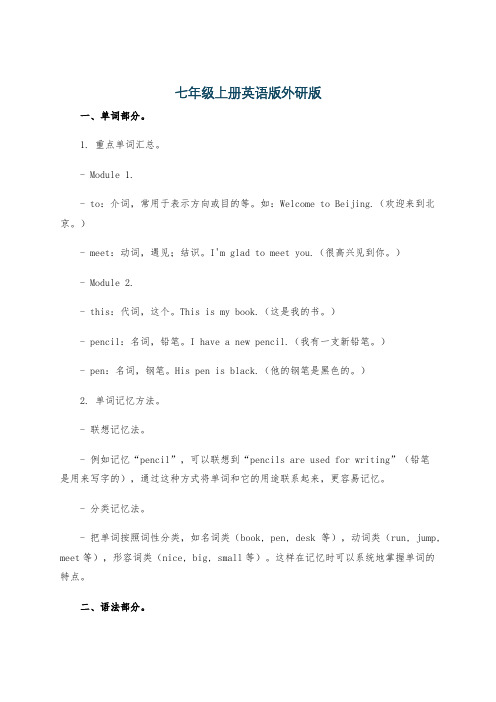
七年级上册英语版外研版一、单词部分。
1. 重点单词汇总。
- Module 1.- to:介词,常用于表示方向或目的等。
如:Welcome to Beijing.(欢迎来到北京。
)- meet:动词,遇见;结识。
I'm glad to meet you.(很高兴见到你。
)- Module 2.- this:代词,这个。
This is my book.(这是我的书。
)- pencil:名词,铅笔。
I have a new pencil.(我有一支新铅笔。
)- pen:名词,钢笔。
His pen is black.(他的钢笔是黑色的。
)2. 单词记忆方法。
- 联想记忆法。
- 例如记忆“pencil”,可以联想到“pencils are used for writing”(铅笔是用来写字的),通过这种方式将单词和它的用途联系起来,更容易记忆。
- 分类记忆法。
- 把单词按照词性分类,如名词类(book, pen, desk等),动词类(run, jump, meet等),形容词类(nice, big, small等)。
这样在记忆时可以系统地掌握单词的特点。
二、语法部分。
1. 一般现在时。
- 概念:表示经常发生的动作或存在的状态。
- 结构:- 主语为第三人称单数(he/she/it等)时,动词要用第三人称单数形式(一般在动词原形后加 -s或 -es)。
例如:He likes reading books.(他喜欢读书。
)- 主语为第一人称(I)、第二人称(you)和复数(we/they等)时,动词用原形。
如:We play football every day.(我们每天踢足球。
)- 用法:- 表示习惯性、经常性的动作。
例如:I get up at six o'clock every morning.(我每天早上六点起床。
)- 表示客观事实或真理。
The earth goes around the sun.(地球绕着太阳转。
2022年外研版初中英语专题复习学案:时态三-一般现在时
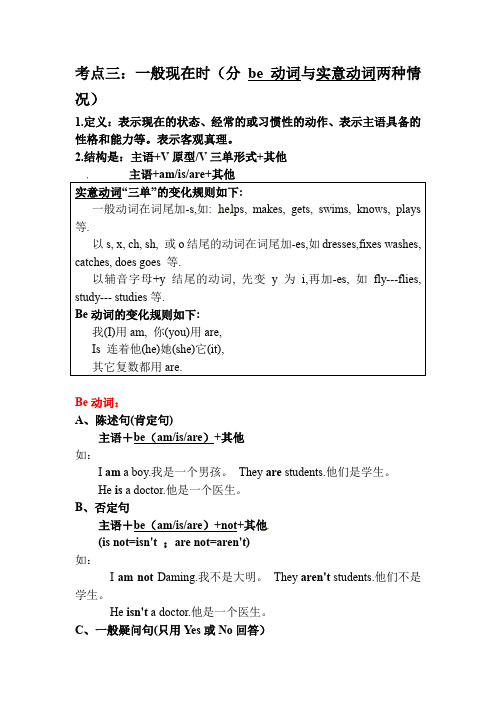
考点三:一般现在时(分be动词与实意动词两种情况)1.定义:表示现在的状态、经常的或习惯性的动作、表示主语具备的性格和能力等。
表示客观真理。
2.结构是:主语+V原型/V三单形式+其他主语+am/is/are+其他实意动词“三单”的变化规则如下:一般动词在词尾加-s,如: helps, makes, gets, swims, knows, plays 等.以s, x, ch, sh, 或o结尾的动词在词尾加-es,如dresses,fixes washes, catches, does goes 等.以辅音字母+y结尾的动词, 先变y为i,再加-es, 如fly---flies, study--- studies等.Be动词的变化规则如下:我(I)用am, 你(you)用are,Is 连着他(he)她(she)它(it),其它复数都用are.Be动词:A、陈述句(肯定句)主语+be(am/is/are)+其他如:I am a boy.我是一个男孩。
They are students.他们是学生。
He is a doctor.他是一个医生。
B、否定句主语+be(am/is/are)+not+其他(is not=isn't ;are not=aren't)如:I am not Daming.我不是大明。
They aren't students.他们不是学生。
He isn't a doctor.他是一个医生。
C、一般疑问句(只用Yes或No回答)Be(am/is/are)+主语+其他?如:Are you Daming? 你是大明吗?Is he a teacher?他是一个老师吗?实意动词:A、陈述句(肯定句)主语(非三单)+V原+其他如:I play basketball every day.我都去打篮球。
They go to sc hool every day.他们每天都去上学。
- 1、下载文档前请自行甄别文档内容的完整性,平台不提供额外的编辑、内容补充、找答案等附加服务。
- 2、"仅部分预览"的文档,不可在线预览部分如存在完整性等问题,可反馈申请退款(可完整预览的文档不适用该条件!)。
- 3、如文档侵犯您的权益,请联系客服反馈,我们会尽快为您处理(人工客服工作时间:9:00-18:30)。
3.表主语具备的性格和能力等:
e.g. She likes noodles. They speak French.
4.普遍真理和自然规律:
e.g. Two plus four is six. The moon goes around the earth.
我父母每星期给我妹妹十元钱。 My parents give ten yuan to my sister every week. 2 如果主语是单数名词 第三人称单数 和 不可数名词,谓语动词要变化
一 动词的变化规则
(1).一般情况下,直接加-s (2).以s. x. sh. ch. o结尾,加-es (3).以“辅音字母+y”结尾,变y为i, 再加-es
写出下列动词的第三人称单数 talk______forget______hope______stop______perform______play______say______ buy______worry______fly______study_______like_______make______take______ love_______recite_______become_______come_______drive_______shine_______ write_______hike______give______see______ stop______shop_______plan______get_______sit_______let_______ cut_______ run_______forget_______begin_______ wash_____watch_______ finish______teach_____fish_______reach_______go_______ do_____ (4).特殊变化的词
You do not work.
Don't you work?
We work.
Do you work?
We do not work.
Don't you work?
They work. He(She,It) works.
Do they work? Does he(she,it) work?
They do not work. He(She,It) does not work.
9. She is always a good student.(改为一般疑问句,作否定回答) ________________________________________________________ 10. Simon and Daniel like going skating.(改为否定句) 11. Do you often play football after school? (肯定回答) _______________ 12. I have many books. (改为否定句)_________________________ 13. Gao Shan's sister likes playing table tennis.(改为否定句)_________________ 14. She lives in a small town near New York. (改为一般疑问句)_________________ 15. I watch TV every day. (改为一般疑问句)___________________________ 16. David has got a goal. (改为一般疑问句)_________________________ 17. We have four lessons.(改为否定句)____________________________
•时态是英语谓语动词的一种形式, 表示动作发生的时间和所处的状态。
构成 1. be动词:主语+be(am,is,are)+其它。如: I am a boy.我是一个男孩。 2.行为动词:主语+行为动词(+其它)。如 We study English.我们学习英语
一 动词的变化规则 1如果主语是名词复数和第一人称I、 we ,谓语动词不用变化, 仍然用动词原型表示 We usually go to school at 7:30 我们通常7:30上学去
doesn’t watch TV every evening 1. Daniel watches TV every evening.(改为否定Daniel )_________________________ 2. I do my homework every day.(改为一般疑问句,并作否定回答) ________________________________________________________ Do you do your homework every day? Yes.I do 3. She likes milk.(改为一般疑问句,并作肯定回答) Does she like milk ___________________________ 4. Amy likes playing computer games.(改为一般疑问句,并作否定回答) Does Amy like playing computer games Yes,she does ___________________________________________________ 5. We go to school every morning.(改为否定句)____________________________ 6. He speaks English very well.(改为否定句)________________________ 7. I like taking photos in the park.(对划线部分提问)__________________________ 8. John comes from Canada.(对划线部分提问)________________ - am, is, are have (有) - has have,
一般现在时(The Simple Present Tense)
1.表示现在的状态:
e.g. He’s twelve. She’s at work.
2.表经常或习惯性的动作:
e.g. I get up at 6:30 every day.
Don't they work? Doesn't he(she it) work?
二、用括号内动词的适当形式填空。 1 has 1. He often ________(have) dinner at home. 2 are 2. Daniel and Tommy _______(be) in Class One. 3 doesn't watch 3. We _______(not watch) TV on Monday. 4. Nick _______(not go) to the zoo on Sunday. 4 doesn't go 5 Do like 5. ______ they ________(like) the World Cup? 6. What _______they often _______(do) on Saturdays? 6 do do 7. _______ your parents _______(read) newspapers every day? 7 Do read 8. The girl _______(teach) us English on Sundays. 8 teaches 9. She and I ________(take) a walk together every evening. 9 take 10. There ________(be) some water in the bottle. 10 is 11. Mike _______(like) cooking. 11 likes 13. My aunt _______(look) after her baby carefully. 13 look/is looking 14. You always _______(do) your homework well. 14 do 15. I _______(be) ill. I'm staying in bed. 15 am 16. She _______(go) to school from Monday to Friday. 16 goes 17. Liu Tao _______(do) not like PE. 17 does 18. The child often _______(watch) TV in the evening. 18 watches 19. Su Hai and Su Yang _______(have) eight lessons this term. 19 have 20. -What day _______(be) it today? - It's Saturday. 20 is 21 We often ___________ (play) in the playground. 21 play 22. He _________ (get) up at six o'clock. 22 gets
• • • • • • • • • • • •
19. Su Hai and Su Yang _______(have) eight lessons this term. 20. -What day _______(be) it today? - It's Saturday. 21 We often ___________ (play) in the playground. 22. He _________ (get) up at six o'clock. 23. ________ you __________ (brush) your teeth every morning? 24. What ________(do) he usually ________ (do) after school? 25. Danny ____________ (study) English, Chinese, math, science and art at school. 26. Mike sometimes __________ (go) to the park with his sister. 27. At eight at night, she ____________ (watch) TV with her parents. 28. ________ Mike _________ (read) English every day? 29. How many lessons _________ your classmate _________ (have) on Monday? 30.What time _________ his mother _________ (do) the housework?
